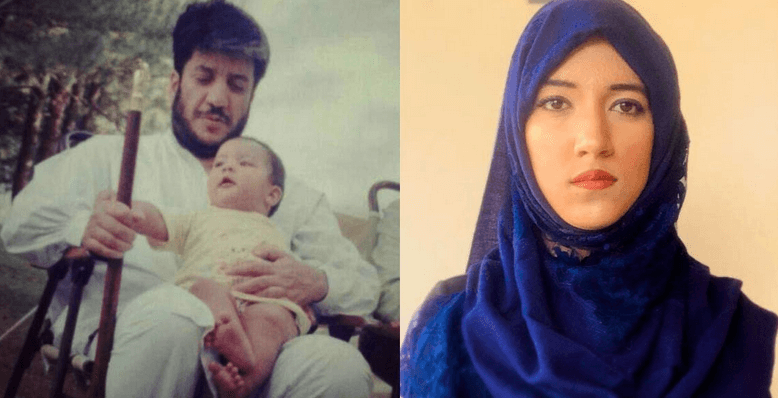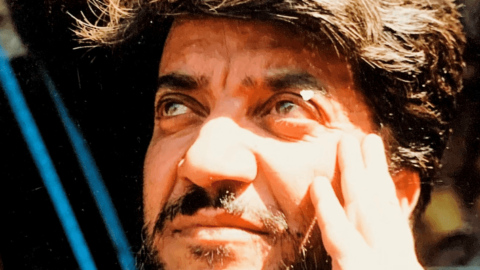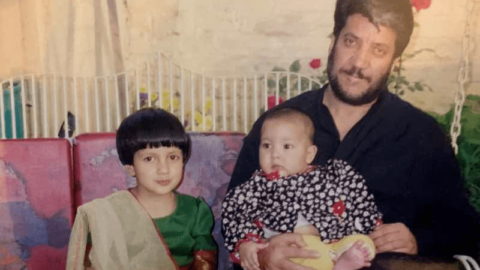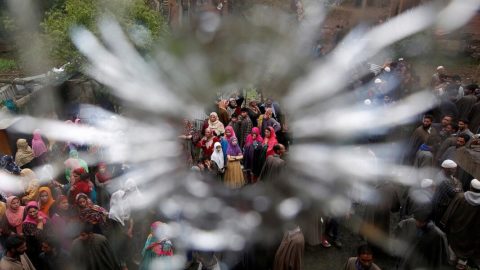By Tazeen Hasan The Indian government's indictment of Shabir Shah's wife in an alleged 2005…

I just landed at Delhi airport, but they won’t let me meet my father
By Tazeen Hasan
Shah, also called the “Nelson Mandela of Kashmir”, is detained for 34 non-consecutive years, and has never been convicted by any court. After four and a half years of pretrial detention, his court hearing finally began on December 13th, 2021 in the current case.
“I just landed at Delhi airport, but they won’t let me meet my father, ” said Sehar Shah, the daughter of imprisoned Kashmiri leader Shabir Ahmed Shah.
It was 2 AM in Canada. I had just gotten into bed after finishing a couple of work assignments when I noticed Sehar Shah’s voice messages on Whatsapp.
I put on my earphones from the bedside drawers and listened.
“I can’t visit my father alone in jail.”
I could feel tears rolling down her face.
“They say only one person can visit him inside the jail. And that too only once a month. Where would my mom leave me? Delhi is not a safe place,” Sehar was definitely emotional. “It is very disappointing.”
Months ago, Sehar told me that the kind of treatment she receives from the jail guards aggravates her depression. She was already using heavy doses of antidepressants at that time.
In last night’s voice messages over WhatsApp, she tells me she takes 11 pills per day.
Sehar says that the jail authorities restricted the family visits to one visit per month. The family can’t travel every month. “It’s very tough both financially and physically,” she says.
According to Sehar, the Indian Court has just begun discussing her father’s case after about four and a half years of pretrial custody. The court case was held on December 10th and December 13th, 2021. While the details are yet to arrive, the next hearing is scheduled for December 21, 2021.
Bilquis Shah, a medical doctor and Shabir Shah’s wife, has also been indicted under the same “money laundering” charges for a crime allegedly committed 16 years ago in 2005. Her court hearing coincided with her husband’s hearing, so she had to travel to Delhi along with her daughter Sehar, an undergraduate political science student in Srinagar.
Sehar last met her father on October 29th, 2021, when she travelled 700 km from Srinagar with her mother. She could only see her father across a blurred and small window and could talk over a microphone for a short time.
The family was appalled to see that Shah could not walk independently. Three men were holding and supporting her father.
Shah was already suffering from diabetes, kidney and heart ailments, arthritis, and sudden loss of conscience. “He looked pale; three men were holding him for support, and he was even holding a stick in his hand, which he had never used before.”
Given the crowded conditions in Tihar jail (where Shah is kept), we can’t rule out the possibility of a COVID-19 infection ailing him, which could be fatal. In May 2021, senior Kashmiri political leader Ashraf Sehrai, 78, died in Jail, probably due to a COVID-19 infection.
It is not clear to the family why Shah could not stand or walk independently. Torture and inhumane conditions are rampant in Indian jails. Kashmiri prisoners are more vulnerable to inhumane conditions because they are considered terrorists and separatists, according to a 2018-UN OHCHR report published on human rights violations in Kashmir.
Her father, detained for 34 non-consecutive years, never got convicted by any court.
He was arrested for the first time in 1968 at the age of 14 for organizing a protest supporting Kashmiris’ right to self-determination. Amnesty International declared him a prisoner of conscience in 1992. The family and Shah’s lawyer in Kashmir confirms that he was never convicted of previous detentions in the past 30 years.
Currently, he is facing 5th year of pretrial detention. His bail request has been refused multiple times during this period. Shah’s advocate told us that he was already on house arrest when they arrested Shah in July 2017.
Given Shah’s previous arbitrary arrests resulting in 30 years of imprisonment, it’s highly plausible that his detainment is once again for political reasons.
Sehar tells us her father’s life is more important than his release; she requests her father to be released on bail. She also demands access to his medical records so that the family can seek an independent evaluation of his medical conditions. Unfortunately, jail authorities have consistently denied these fundamental rights demanded by Shah’s lawyers.
Shabir Shah is enduring abysmal living conditions in a six-by-eight cell with no fresh air, inadequate sanitation facilities inside the Tihar jail. These issues present a heightened risk to his health, who already suffers from multiple medical conditions mentioned before.
Shah is not allowed to call his family regularly from the prison.
While the Court granted bail to the primary accused, Shah faces the 5th year of pretrial detention for an alleged crime committed 16 years ago.
Sehar also mentioned that Indian courts and jail authorities never responded to the family’s requests to access his medical records and families’ requests to allow Shah’s nephew and nieces to meet him as visitors.
It is very inconvenient to travel to Delhi from Kashmir for Shah’s sisters and brothers, who are allowed as visitors. Even Sehar and her mother can’t travel every month. So the family made multiple requests to include Shah’s nephews and nieces in the visitor list. According to Sehar, the Court did not respond to the request.
While arbitrarily detaining Shah, the Indian government violates fundamental human rights and multiple international fair trial standards.
According to international Fair trial standards:
- Shah shouldn’t be imprisoned in unhealthy, crowded conditions lacking sanitation standards.
- Shah is entitled to meet his family in a comfortable atmosphere at regular intervals;
- Shah is entitled to get bail, given the prolonged pretrial detention;
- Shah is entitled to consult his personal physicians and get treatment independently at his own cost;
- Shah is entitled to get a speedy trial.



